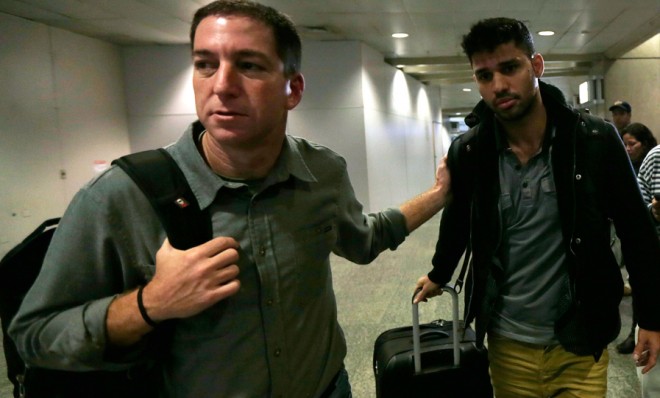3 lessons from the detainment of Glenn Greenwald's partner
David Miranda's run-in with British authorities offers insight into the ongoing NSA controversy


A free daily email with the biggest news stories of the day – and the best features from TheWeek.com
You are now subscribed
Your newsletter sign-up was successful
British authorities are facing a global backlash for the nine-hour detention of the partner of Glenn Greenwald, the Guardian journalist who published Edward Snowden's leaks on U.S. surveillance programs. Greenwald called the move an abuse of counterterrorism laws and an attempt to intimidate him, and liberal British lawmakers have demanded an investigation. The U.S. says it had nothing to do with the case.
David Miranda, who lives with Greenwald, was held and questioned at London's Heathrow airport on his way back to his native Brazil from Germany, where he had met with Laura Poitras, a documentary filmmaker who has been helping Greenwald publicize the secret documents Snowden has provided.
British police held Miranda as long as they could under Section 7 of the U.K.'s controversial Terrorism Act, and they confiscated his laptop, memory sticks, and other electronics. Authorities would not comment, other than to say that Miranda's detention was a legitimate police action aimed at keeping the public safe. Civil rights activists called the incident an example of how the terror law was ripe for abuse against foreigners, usually Muslims.
The Week
Escape your echo chamber. Get the facts behind the news, plus analysis from multiple perspectives.

Sign up for The Week's Free Newsletters
From our morning news briefing to a weekly Good News Newsletter, get the best of The Week delivered directly to your inbox.
From our morning news briefing to a weekly Good News Newsletter, get the best of The Week delivered directly to your inbox.
What can we glean from the incident? Here are three lessons:
1. There is a price for embarrassing governments
The treatment of Greenwald and Miranda should come as no surprise to anyone familiar with the sad fate of Snowden, who was compelled to seek asylum in Russia, says Robin Abcarian at the Los Angeles Times.
"The price that governments exact of those who embarrass them is steep," Abcarian says, "and there will probably be years of this treatment for journalists like Poitras, the person to whom Snowden first revealed his trove of stolen documents, and Greenwald, who in collaboration with Poitras has written most of the Guardian stories about NSA and FISA (Foreign Intelligence Surveillance Act) Court overreaches."
A free daily email with the biggest news stories of the day – and the best features from TheWeek.com
2. Counterterrorism laws give authorities too much power
It seems clear that Miranda was never even suspected of terrorism, so the legal basis for his detention, at best, was flawed, says the Financial Times in an editorial. Even those who feel there is a genuine national security interest for governments to pursue Snowden and figure out what secrets he stole can see that this is a case of harassment, the newspaper's editors say.
"This incident is also a reminder that U.K. anti-terror laws are too sweeping," says the Times. "Under the 2000 Act, Britain’s police can detain any individual, even if they have no prior suspicion of terrorist activity by that person. This is nothing less than a draconian piece of legislation."
3. Miranda wasn't entirely innocent
Miranda's ordeal is a reminder that counterterrorism laws go too far, says Rob Crilly at Britain's Telegraph. Still, he says, "The British security services had a legitimate reason — and a duty — to detain and question the man." Miranda isn't a journalist; he was serving as a "document mule" — as reporter Joshua Foust puts it — carrying information regarding terrorist surveillance for Greenwald and the Guardian, intelligence that is specifically covered under the U.K. law.
Harold Maass is a contributing editor at The Week. He has been writing for The Week since the 2001 debut of the U.S. print edition and served as editor of TheWeek.com when it launched in 2008. Harold started his career as a newspaper reporter in South Florida and Haiti. He has previously worked for a variety of news outlets, including The Miami Herald, ABC News and Fox News, and for several years wrote a daily roundup of financial news for The Week and Yahoo Finance.
